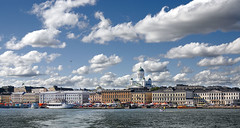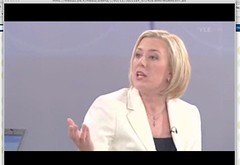Monday, October 27, 2008
Few Steps Away From The Left
The centre-right party National Coalition (Kokoomus) is the winner of the elections being for the first time in Finland´s history the biggest party on the municipal level nation-wide. They even managed to pass the Social Democrats in Vantaa, a traditionally strongly leftish city next to Helsinki. Kokoomus is growing its alliance amongst Finns, which I hope means moving even more strongly towards liberalism also socially.
The Greens beat the Social Democrats with clear numbers in Helsinki and became only for the second time in history the second biggest party of the capital. I hope this means more investments in services, in public transport and urban planning. Traffic policy is the big issue where Kokoomus and the Greens will most likely be bolstering their muscles against each other in the course of the next four years.
Nationally the biggest winner of the elections is the populist True Finns growing their seat number nationally with 336 seats. They have clearly marked their place as a serious contestant for the votes of the working class and the unemployed with a xenophobic message. This truly worries me even if one could seek for some consolation from the fact that the rise of the populist right is a pan-European phenomenon. I understand the fear of insecurity that the True Finns tap into but in times like these we really see what kind of a wonderful safety net the EU and the euro are for us. The responsibility of the other parties is not to ignore the True Finns but to take them on their message and reveal the weakness of their rhetoric. It is however yet difficult to make any prognosis what their support will result to apart from offensive language.
The Social Democrats came down in the elections with rocket speed. Their populism did not work in this economic situation with factories being closed down across the country. I feel most Finns understand that it is time to save, not to demand more for free. Only in Helsinki they lost nearly 12.000 votes mostly going to the Greens and True Finns. The fall especially in Helsinki was harder than anyone expected. It only continues the long list of evidence on the crisis of European Left. Chairperson Urpilainen´s strategy of claiming her party to be part of the centre can be questioned - at least the voters were not energised by it. Taking the position of the conservative and stubborn defender of the Nordic welfare state (which they claim to be their creation) is not a very aspirational campaign message.
In other parts of the country the results also show difficulties for the Centre Party, traditionally the biggest party on local level and also in the last parliament elections. The success of Kokoomus is mostly due to the problems of the Centre Party. The position of Prime Minister Vanhanen as the party leader is significantly weakened for instance by the poor results in Lapland - Centre Party lost there 8 % of their votes from 2004 meaning over 6 000 votes. It is interesting to see how the price of being in government is only paid in these elections by the Centre Party.
Friday, October 24, 2008
Out of Touch
The weakest from the debaters based on my judgement were the leader of the Greens Tarja Cronberg, leader of the Centre Party Matti Vanhanen and leader of the Social Democrats Jutta Urpilainen. Minister of Labour Cronberg spoke twice in the first hour and is not able to push forward the Green agenda on services and quality of life. She tries to balance urban life and rural areas but gets somewhat confused with all the aspects. She becomes a voice of the government rather than representing the Greens in local politics although she improves her performance towards the end. Prime Minister Vanhanen's problems are somewhat alike. As Prime Minister he seems to act like he would be somewhat above the others and ends up coming across as smug and arrogant and not willing to take any criticism. Opposition leader Urpilainen however falls into the trap of populism. She is not able to answer questions on how Social Democrats would fund their "more, more, more" agenda. Urpilainen also gets unfortunately agitated when pushed into the corner with tough questions.
The winners of the debate are the populist True Finns and the centre liberal National Coalition. They get their ideological message across (True Finns about defenfing the small man and National Coalition on balancing costs and income). Leader of the National Coalition, Minister of Finance Jyrki Katainen manages to stay calm and push through the message that the current government has invested in municipalities. Leader of the centre-right Swedish People's Party, Minister of Culture Stefan Wallin manages also to be clear and talk about caring and climate change.
But the key problem is not between people, it is in the nature of the debate. The most absurd moment was the discussion over a recent poll where 62 % of respondents think that politicians can be bought in urban planning decisions. The reaction of the Party Secretary Jarmo Korhonen:"No Finnish politician can be bought. I know." That's the way Finnish dialogue works.
Overall the discussion stays in concepts only familiar to politicians and very seldom looks into the position of the individual in the changes. Dear leaders, no one uses words such as structure and resource in normal language. It enforces the idea that in order to take part in politics, you need to learn a new language.
Tuesday, October 21, 2008
This Is What This Election Is About
Colin Powell endorsed Barack Obama last Sunday, which was a major blow for the Republicans. Out of the entire interview, this reasoning touches me. This is why they should vote Obama.
Added later the same day: And what I was trying to point out, the phenomenal New York Times columnist Maureen Dowd puts down in the way that only she can. Thanks for the tip, Mr Minnesota.
Monday, October 20, 2008
Printed Element of Surprise
A clear example of this wonderful quality of newspapers was the Guardian of last Friday, which I picked up on my way to a lunch on my free day. While eating my sandwich, I glanced through the news section. Before I got halfway, I threw the newspaper into my gym bag. I bumped into it again on my lazy Sunday and found myself getting completely excited by a big article on the Qur´an. Madeleine Bunting´s and Ziauddin Sardar´s debate on interpretation of the holy book actually taught me new things. Sardar´s radical position of trying to read the Qur´an in a straight forward way, without the historical load really fascinated me.
"For me the Qur´an is a living, dynamic book", Sardar wrote. "This is not just a definition of a believer. It is also a statement about belief...So, with new determination, I say that we Muslims have to teach ourselves to read and think about the Qur´an without the weight of tradition and classical commentaries. Muslim scholars and experts should not exist as gatekeepers, permanently excluding us from using our knowledge and insight to make sense of the Qur´an for ourselves."
Through what kind of Google search would I ever bump into this?
Sunday, October 19, 2008
Sunday
This is very close to being the perfect Sunday song. The amazing Duffy with Jools Holland. There is just nothing that beats a BIG orchestration. The encouragement to love again, to be bold and hopeful even if it seems very difficult is one amazing message. The stubbornness and daring for the pursuit of happiness. That sometimes it means that you make some drastic moves in your life, which may hurt in the beginning in order to gain the well-being that in the end counts. These moves may be about relationships like in the case of the song or about the other main components in our lives such as housing, work and so forth.
I hope this is not only Sunday talking inside me.
Tuesday, October 14, 2008
Monday, October 13, 2008
Old Boys' Club Challenged
The professors and retired politicians are annoyed that Stubb is opening up the diplomatic circle by allowing the daily Helsingin Sanomat to publish assesments of Finnish ambassadors on the status of world politics. Stubb asked these reports following the Georgian conflict and then decided to allow the main daily to publish some of them anonymously.
I read the article based on the reports. There is nothing shocking. The diplomats are divided between more skeptic and more optimistic ones when it comes to Russian relations with the European Union. Some express doubts on the future of the United Nations as a conflict mediator. Some use a bit livelier language such as:
"Finland needs to decrease its dependency on Russian energy. This should be done gradually and quietly, not in a demonstrating manner by fearmongering on the Russian threat. But it needs to be done. The US Marines have a saying:''If you grab them by the balls, their hearts and minds will follow'. i presume the Russian know the proverb too."
So let's get this straight. The Minister paid by us asked civil servants paid by us to assess global politics and then the minister decided to share these reports with us without sharing the names of the ambassadors. Former foreign minister Paasio wonders whether this leads to people thinking twice before telling things to Finnish diplomats. Some of the other commentators have been wondering what it does to our international reputation when diplomats drift away from the country's policy. Come on. Anonymous and differing reports from different corners of the world lead at least in my thinking to greater respect towards the men and women in our diplomatic service. What is better service to the people than allowing us to understand what are the cross currents guiding our foreign policy? I cannot help thinking that it works for some people's benefit to keep up the image that foreign policy is super secretive and not meant for the Joe on the street to understand.
Thursday, October 09, 2008
Going all ARTE
Just found this video from YouTube by googling StrangerFestival where they interviewed both me and the maker of one of my favourite videos from the competition. Should have worked on my German a bit more in school.
Wednesday, October 08, 2008
The Troubles
An innocent question in a discussion between Finnish secondary school students and President Halonen earlier this year on the Finnish civil war led to an unsurprising reaction from the President. She hesitated for a moment, clearly felt uncomfortable to answer and finally said:"red rebellion". Halonen´s reaction to events long before she was born showed how deep the civil war is still especially in the generation of my parents. How it is still, in 2008, more or less leading the list of things people don´t want to talk about.
The small article in Helsingin Sanomat earlier this year describing this moment popped into my mind tonight when listening to Kjell Westö talking about his book Missä kuljimme kerran - one of the most widely read Finnish novels of the last 10 years. The book describing the generation born around 1900 has now been translated into Dutch and Westö was visiting the Finnish Embassy for that occasion. He shared with an audience a comment he heard, which describes to a large extent still the attitude of Finns to the tragic events of 1918 where according to some estimates 37.000 people lost their lives:"We have not discussed that for 100 years and we are definitely not going to start now."
Westö´s book is an important book for me. It helped me understand what my grandparents have gone through, what was the world my parents were born into and why the Finnish identity is the way it is. It also helped me start a discussion with my older relatives on the time before I was born. Westö said tonight beautifully that with his books he attempts to help the audience to remember that there were people on these streets before. He also reminded the audience that even when language played a big issue in the civil war, there were Swedish-speaking and Finnish-speaking people on both sides. The histories of people are more complicated than we often allow ourselves to realise.
I always thought that the tragic incidents of 1918 as well as 1939-1945 are issues that I can talk about with an open and critical mind. I mean I had no part in them. This was until 2004 when in a New York subway an American lady in her 60s asked me and my friends in the middle of a casual conversation:"I just wanted to check. During The War, which side were you on? On our side or the other side?" That uncomfortable feeling of shame, that sudden sweat and the blushing caught us all by surprise. We stuttered and it took us a lot of time to deliver an answer. Maybe Westö was right today when he said that it takes 6 generations before a war turns into another historical event.
Tuesday, October 07, 2008
We The Republic
And all this with just a click - for free. And we even got into The Guardian.
Monday, October 06, 2008
Logistics of Aspiration
And then there is the London that you only see when you spend time with people who live here. It is those wonderful cafes, those phenomenal people in those lunch parties, its that ambition you catch when you talk to people about their future. Its drinking that last gin tonic at that upstairs bar too late in the evening and biting into that home-made pakora at that cosy kitchen table. Its those discussions ranging from religion in public life to the differences between X Box and Playstation.
And as a journalist this still is the heaven for me in terms of reading. Walking to that newsstand and with only a few pounds accessing the best writing of today. I always come back with lists of books to buy and clippings of superb articles.
And then, yes, then there is the transport. Its that Jubilee Line stopping between stations for 25 minutes, the Circle Line terminating two stations too early, that bus taking ages in crossing the Thames, sweating through those stinking and boiling hot transfer tunnels and that smell of urine from your fellow passenger. Living in Amsterdam I guess makes you into a spoiled brat but spending 90 minutes underground in reaching your destination is not really something that I would see myself doing every morning. It gives you time to read books though.
Now time for bed, tomorrow we are releasing some good thinking.
Wednesday, October 01, 2008
The Video Republic
On Monday we launch together with Demos a report on youth and video which has been carried out associated to StrangerFestival. From Monday 6 October the report is available for downloading at www.demos.co.uk. I highly recommend reading it. But here as a taster, a video building up the excitement. The report is funded by Helsingin Sanomat Foundation.


















